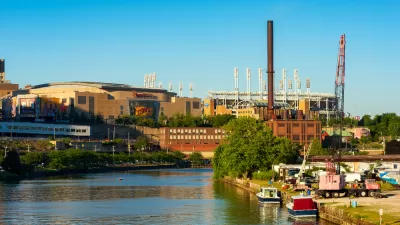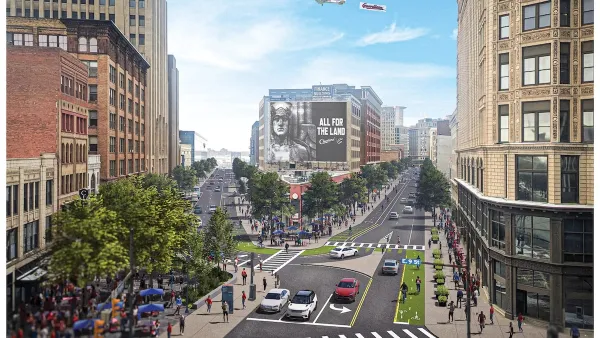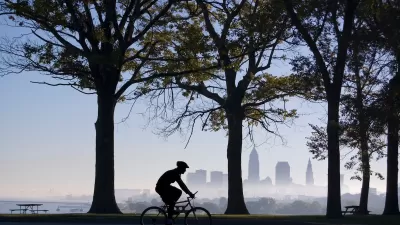The deal is not yet done, but the home team of the LeBronaissance, the most ostensible sign of Cleveland's resurgence, have reportedly asked Cuyahoga County officials to split the cost of an arena renovation.
"The Cleveland Cavaliers have quietly suggested evenly splitting with Cuyahoga County the cost of a multimillion-dollar overhaul of the exterior of Quicken Loans Arena as part of a project to increase the building's square footage," reports Andrew J. Tobias.
"The team's plan would expand the building's footprint, creating more public space inside -- and additional opportunities to sell concessions and other items -- and giving the concrete building a glass exterior," according to the article's sources. And the team, like so many other professional sports franchises in the United States, is looking for public money to help get the renovation done. The team has asked that the county pay half of the project's $140 million price tag, " by borrowing money through the issuance of bonds, and by using revenues from the county's 'sin tax,' a countywide tax on alcohol and cigarettes, a 20-year extension of which county voters approved last May."
Quicken Loans Arena, also known as The Q, was built in 1994. The project was made possible, along with Progressive Field (formerly named Jacobs Field and the home of the Cleveland Indians Major League Baseball team), by $120 million borrowed by the county. The county still owes $55 million on that debt, according to the article.
FULL STORY: Cleveland Cavaliers suggest 50-50 split with Cuyahoga County for costly Quicken Loans Arena renovation

Planetizen Federal Action Tracker
A weekly monitor of how Trump’s orders and actions are impacting planners and planning in America.

San Francisco's School District Spent $105M To Build Affordable Housing for Teachers — And That's Just the Beginning
SFUSD joins a growing list of school districts using their land holdings to address housing affordability challenges faced by their own employees.

The Tiny, Adorable $7,000 Car Turning Japan Onto EVs
The single seat Mibot charges from a regular plug as quickly as an iPad, and is about half the price of an average EV.

Seattle's Plan for Adopting Driverless Cars
Equity, safety, accessibility and affordability are front of mind as the city prepares for robotaxis and other autonomous vehicles.

As Trump Phases Out FEMA, Is It Time to Flee the Floodplains?
With less federal funding available for disaster relief efforts, the need to relocate at-risk communities is more urgent than ever.

With Protected Lanes, 460% More People Commute by Bike
For those needing more ammo, more data proving what we already knew is here.
Urban Design for Planners 1: Software Tools
This six-course series explores essential urban design concepts using open source software and equips planners with the tools they need to participate fully in the urban design process.
Planning for Universal Design
Learn the tools for implementing Universal Design in planning regulations.
Smith Gee Studio
City of Charlotte
City of Camden Redevelopment Agency
City of Astoria
Transportation Research & Education Center (TREC) at Portland State University
US High Speed Rail Association
City of Camden Redevelopment Agency
Municipality of Princeton (NJ)





























